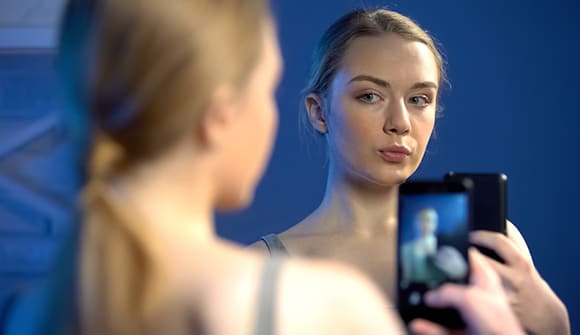Picture perfect?
A counselor weighs in on how face- and body-altering apps can affect mental health.
Article Author: Juliette Allen
Article Date:

“This is not okay. This is why people develop eating disorders.”
Actress Lili Reinhart posted these scathing words to her Instagram account in response to the popularity of a new mobile app that lets users alter how their bodies appear in photos. Whether it’s a smaller waist, thinner arms or more defined curves, the power to create the "perfect body" is in the palm of your hands.
What’s the problem?
Mary Lou Prendergast, LMHC, a licensed mental health counselor with Baptist Behavioral Health, warns body-altering apps can lead to body dysmorphic disorder – a condition in which people fixate on real or perceived flaws – which then can lead to eating disorders like anorexia and bulimia.
“It’s very damaging,” she said. “It’s just a recipe for disaster in some cases.”
Prendergast, who specializes in conditions such as body dysmorphic disorder, eating disorders and self-esteem issues, believes apps that allow users to alter their bodies or faces in photos are targeted toward teens and young adults. These two age groups often feel pressure to project a certain image on social media.
“The problem with social media is we think we’re putting things out there to share our lives with other people, but as a recipient of social media, we’re actually comparing ourselves to others,” she said. “I see girls I work with in real life during counseling and they’ll show me what they post on social media. They’re able to make their waists look smaller, anything really. And the end result is, they’re not even the same person that they are in real life.”
Instagram vs. reality
The issue arises, Prendergast said, when teens and young adults don’t feel comfortable interacting with others in real life because their actual appearance doesn’t match the image they’ve portrayed to others on social media.
“Social media just distorts their senses of reality, both with their own body and what they see from everyone else online,” Prendergast said. “It’s like there’s this whole fake world going on.”
Because teens are unlikely to give up social media entirely, Prendergast says it’s important for parents to recognize signs that their child may have an unhealthy relationship with social media. They may include:
- Oversharing
- Spending more time on social media than interacting with people in real life
- Becoming stressed or upset if no one responds to a social media post
- Spending at least four hours a day on social media, ignoring a real social life
- Becoming obsessed with social media status
- Waking up in the middle of the night to check social media profiles or posts
- Feeling uncomfortable interacting with others outside social media
- Being unable to curb social media usage, despite trying
Time to unplug
If a teen is unable to put down his or her cell phone and engage in the real world for more than a few moments, Prendergast suggests parents intervene by creating some rules regarding social media usage. The agreement, crafted with input from both kids and parents, should address the following questions:
- What are the good things about social media use?
- What are the potential problems with social media use?
- What is the maximum daily time each person should spend on social media?
- Which times should we unplug from social media?
- Which areas of the home should we keep social media-free?
- What are some alternative activities we can do instead of social media?
Social media use and the pressure to be picture perfect can cause a variety of mental health issues in teens and young adults. If your child or someone you know is struggling, contact the experts at Baptist Behavioral Health at 904.376.3800.



